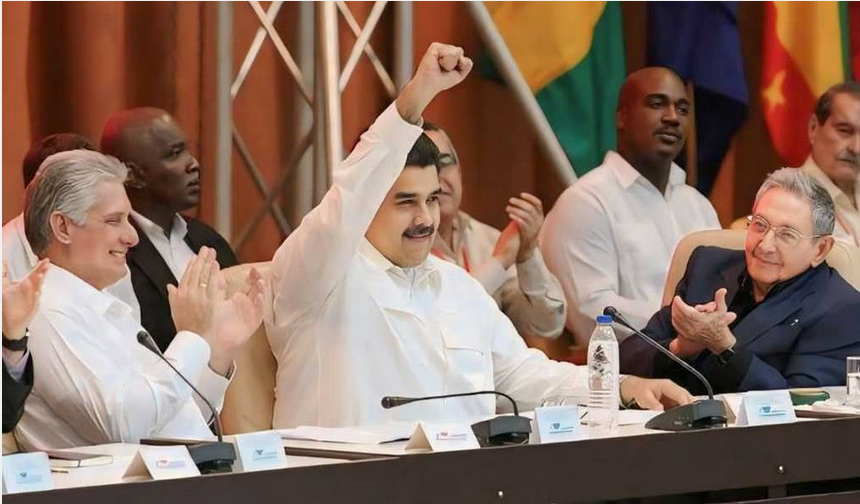Repression and Espionage

Cuban authorities have helped Venezuela for at least 15 years to redesign its armed forces and intelligence services, “imposing surveillance and fear.”
By Marleidy Muñoz and Raul Medina Orama (El Toque)
HAVANA TIMES – Nicolas Maduro proclaimed himself the winner of the July 28 presidential elections in Venezuela and aims to stay in the Miraflores Palace, at least until 2031. How much does Hugo Chavez’s heir owe to Cuban intelligence for the survival of the “Bolivarian Revolution”? How has the Havana regime helped Caracas quell dissent?
In recent weeks, to suppress protests in support of former presidential candidate Edmundo Gonzalez and opposition leader Maria Corina Machado, the Maduro regime has escalated its repression against politicians, electoral witnesses, and the protesting population. In this context, several reports alleging the presence of Cuban state agents in Venezuela have rekindled discussions about the Cuban government’s interference in the South American country.
According to reports from NGOs, press reports, and citizen testimonies, Cuban authorities have been helping Venezuela for at least 15 years to redesign its armed forces and intelligence services, “imposing surveillance and fear.”
After suffering his first electoral defeat in 2007, Chavez, who sought to expand his powers and eliminate presidential term limits through a constitutional referendum, continued to seek mechanisms to stay in power. Fidel Castro provided him with agents from Cuba’s Armed Forces and security, intelligence, and counterintelligence apparatus.
Cuban intelligence used “missions of various types as a mask and disguise, whether for cooperation in sports, health, or education,” said Luis Almagro, Secretary-General of the Organization of American States (OAS), during the June 2020 event “Cuba in Venezuela, the Conquest of the 21st Century,” organized by the Center for Latin American Studies (CASLA Institute).
During his first 10 years in power, Chavez made 24 official visits to the island and repeatedly expressed being “fascinated” by Castro. In 2007, the Venezuelan leader declared that Cuba and Venezuela were “one nation” and that “at heart, we are one government.”
After Chavez’s death in 2013, and a contested election that kept the “Bolivarian Revolution” in power by a narrow margin, Maduro maintained alliances with the Cuban regime. According to Rafael Ramirez, Chavez’s Oil Minister between 2002 and 2013, Maduro’s designation as Chavez’s successor had “a lot to do with the influence of the Cubans.”
However, the current Venezuelan opposition leadership suggests that Havana’s importance in the Venezuelan scenario could change. During the presidential campaign, Edmundo Gonzalez declared that his government would propose a reconfiguration of Venezuela’s foreign policy based on sovereignty and mutual respect, with an emphasis on revitalizing relations with Latin America and reevaluating ties with Cuba, China, Russia, and Iran.
“We need to review relations with Cuba, because it is not just the issue of SAIME [Cuban presence in the Administrative Service of Identification, Immigration, and Foreign Affairs]; it is the issue of ports and airports, citizen ID, intelligence services; in short, there is a wide range of cooperation that will need to be reviewed,” Gonzalez told Voice of America (VOA) in May 2024.
When María Corina Machado won the opposition primary in October 2023, she said that without Chavismo in power, “there will be no way or area in which the Cuban regime interferes in the affairs of the Venezuelan state, nor Venezuela in the affairs of the Cuban state.”
Agreements That Allowed Havana to “Redefine Security” in Venezuela
Two agreements signed in May 2008 “gave Cuba vast access to the Venezuelan military and wide freedom to spy on and reform it,” revealed a Reuters investigation published in August 2019.
According to the documents reviewed by the news agency, the agreements led to “the imposition of strict surveillance of Venezuelan troops through an intelligence service now known as the General Directorate of Military Counterintelligence, or DGCIM.” The alliance allowed the Cuban Armed Forces to:
- Train soldiers in Venezuela.
- Review and restructure parts of the Venezuelan army.
- Train Venezuelan intelligence agents in Havana.
- Shift the intelligence service’s mission from spying on foreign rivals to monitoring its own soldiers, officers, and even high-ranking commanders.
With the advice of Cuban military personnel, Venezuela “restructured the intelligence unit into a service that spies on its own armed forces, instilling fear and paranoia and crushing dissent,” reported Reuters.
Retired Venezuelan Army General Antonio Rivero, a senior ex-officer exiled in Miami since 2014, also confirmed to Dialogo Americas that Cuba and Venezuela signed several secret military agreements in 2008, “handing over control of the Venezuelan Armed Forces to Cuba.”
“In 2008, the presence of Cuban military personnel [in Venezuela] was consolidated through 15 secret agreements between Cuba and Venezuela to transform the Venezuelan Armed Forces and turn them into the same structure that functions in Cuba,” declared General Rivero, who also served as head of civil protection and emergency management under the Chavez government.
“Chavez invested billions of dollars in Russian weapons, with Cuban mediation, and thus Venezuelan military personnel began to give up space to ‘Cubanize’ the Armed Forces,” added the ex-military officer.
According to General Rivero, “Cuban officers developed doctrines, training manuals, and directed exercises, while some Venezuelan officers felt as if they were serving in the Armed Forces of another country.”
One of the agreements mentioned by General Rivero was the creation of a Cooperation and Liaison Group (GRUCE), a unit composed of C


